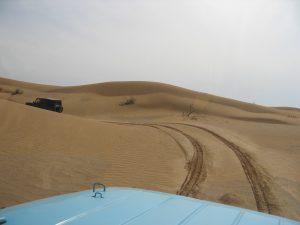The Turkmen government is reaching new levels of absurdity, this week lashing out at a Russia-based TV channel for mentioning a coming heatwave borne by hot winds blowing from Iran and Turkmenistan into Tajikistan.
On July 28, the Turkmen Ministry of Foreign Affairs issued a statement criticizing Mir TV for reportage from Tajikistan that an expected heatwave in the mountainous Central Asian nation was due to hot winds blowing through Iran and Turkmenistan. The Turkmen called the report “professionally illiterate” and “politically incorrect.” Ashgabat interpreted the weather report as a direct insult, apparently reading between the lines and determining that the Tajik reporter was accusing Turkmen winds of carrying the coronavirus into Tajikistan.
“We believe that any mention of the specific name of a country in the context of the movement of air masses from or through its territory may raise suspicions of the transfer of dangerous infections to other countries,” the Turkmen Foreign Ministry said.
“Therefore, the Turkmen side, noting the political shortsightedness of the correspondent who prepared and disseminated the information in question, stresses that violations of the norms of political ethics established in international affairs are unacceptable.”
The ministry’s statement points out that most scientists agree that the novel coronavirus currently wreaking havoc everywhere in the world (except Turkmenistan), can be spread via a variety of means. The Turkmen Foreign Ministry focuses on “aerosol droplets.”
Scientists generally separate the bits of moisture expelled from a person who coughs or sneezes into “droplets” and “aerosols.” As one scientific paper explains: “Bigger globs fall faster than they evaporate so that they splash down nearby in the form of droplets… Smaller globs evaporate faster in the form of aerosols, and linger in the air, and drift farther away than the droplets do.”
The science around how fast such tiny globs of potentially virus-laden moisture evaporate is evolving as researchers rush to understand the novel coronavirus. As the paper referenced above, which is available for open access now and will appear in the Environmental Research journal’s September volume, and the World Health Organization’s own Q&A section highlight, concerns about aerosols revolve around how they behave in poorly ventilated and crowded indoor spaces.
Absolutely no one outside of the Turkmen government is warning that hot winds blowing across a border, crossing thousands of miles, could potentially transport the virus.
Turkmenistan remains the only country besides North Korea in all of the Eurasian continent not to have officially confirmed a case of COVID-19 — and North Korea recently locked down the border city of Kaesong over a suspected case. In the weeks after a WHO mission finally reached Turkmenistan, the government has urged people to stay away from large gatherings and wear masks. But it has done so without ever mentioning that the deadly virus is already inside the country.
Dr. Catherine Smallwood, a senior emergency officer at WHO Europe and the mission’s head, was circumspect in a July 15 end-of-visit press conference, according to a Eurasianet report, broadly lauding Turkmen efforts while also suggesting the authorities activate “critical public health measures in Turkmenistan, as if COVID-19 was circulating.”
Instead, Ashgabat had already begun warning about dust in the wind and fingering the Aral Sea disaster as perhaps responsible for the non-existent health emergency. On July 12, the Turkmen Health Ministry recommended mask wearing to protect individuals from increased “dust” in the air. It also recommended maintaining distance from other people, but didn’t included a reason.
As RFE/RL notes in a recent report: “In the local media, ‘harmful dust’ has turned into a euphemism for COVID-19.”
We’ll have to see what excuses Turkmen authorities concoct once the hot winds of summer die down.































